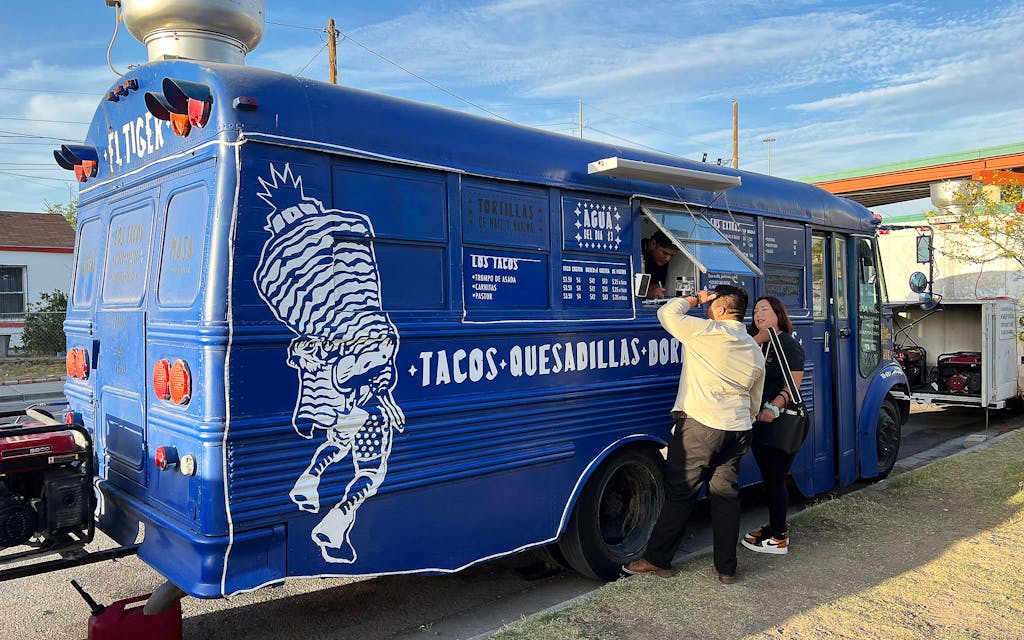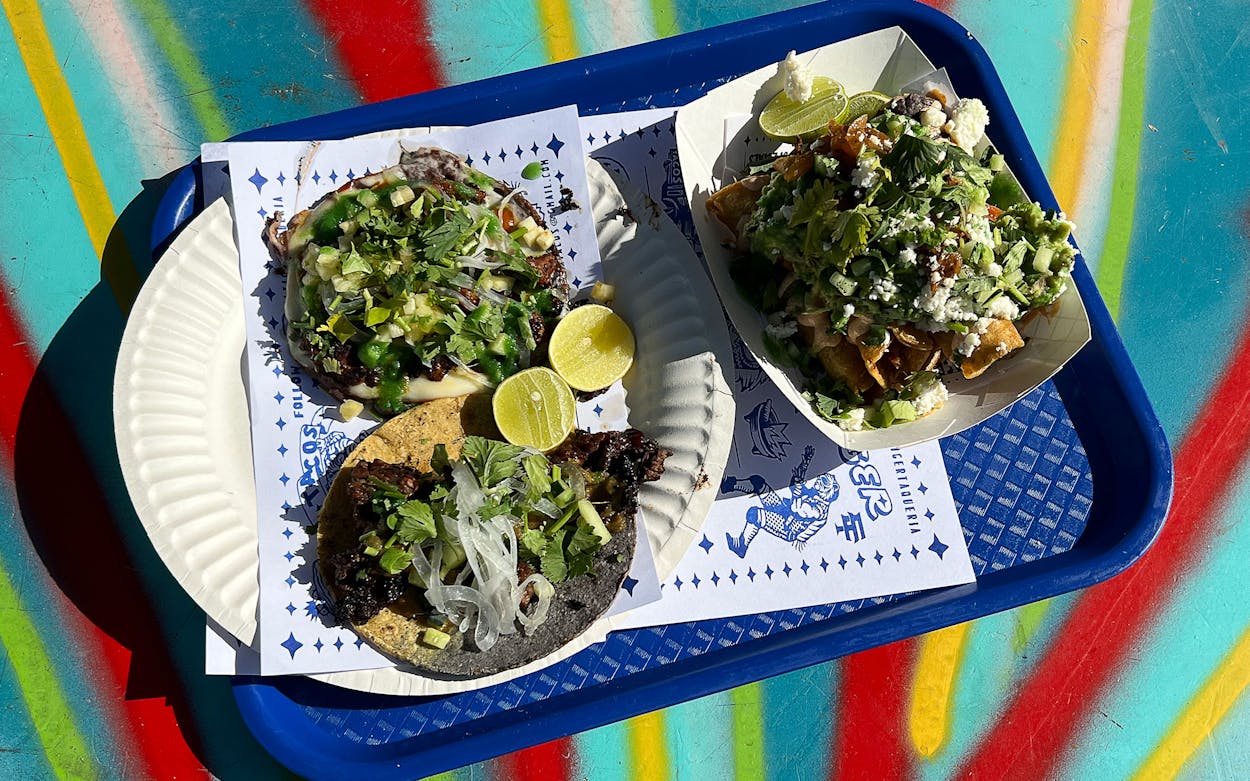Jorge “Monstro” Ortiz, owner of El Tiger Taqueria, in El Paso, was born for the restaurant industry.
He began his kitchen training at three years old, when his grandmother taught him to peel potatoes and carrots and slice squash for soup at her Juárez restaurant, La Cabaña. At five years old, he was tagging along to local mercados to shop for produce and meat with his father, who helped operate the dining establishment. When Ortiz was nine, he began running deliveries. In middle school, he was cooking on the line and washing dishes, mostly on weekends so as to not interfere with his schoolwork. In high school he helped an uncle selling long, bacon-wrapped, whole bean–loaded, meat-blanketed Juárez-style hot dogs cradled in crusty, miniature baguette–like bolillo rolls in El Paso.
After graduation Ortiz enrolled at the University of Texas at El Paso to study electrical engineering—but he didn’t leave food behind. He met the owner of a wine bar and eventually talked his way into a kitchen job there. “It was just like my grandmother’s place, but just with a nice way of treating the product,” he says. “I fell in love with it.”
Perhaps that love was meant to be. Soon after, Ortiz was injured in an automotive accident and was out of school long enough to lose his financial aid. He rededicated himself to cooking, first at the wine bar and then at other local restaurants, before landing a job at Anson 11 in 2013. While there, Ortiz worked his way up the kitchen ranks from prep cook to a senior position as chef de cuisine.
The young chef continued his peripatetic ways. Ortiz moved to Seward, Alaska, to work as the executive chef at Chinooks. He admits to bluffing that he could work as an executive chef, “and ended up doing it,” he says with a chuckle. Next Ortiz moved to San Francisco to work at James Beard Award–winning chef Dominique Crenn’s Atelier Crenn. After a few months in San Francisco, he went back to El Paso in 2018 to arrange a permanent move to California. Instead he ended up once again at Anson 11.
“It seemed like the right thing to do,” Ortiz explains. “I had already made up my mind to put border food on the map.” From that point on, he dedicated his talents to his home region’s foodways, first at Taft-Díaz, a high-end American-Mexican restaurant in the Stanton House, and then with his own business, El Tiger Taqueria.

The operation is only six months old, but it’s already one of the best taquerias in El Paso. Along with Taconeta, Taco Shop, and two restaurants with James Beard Award–nominated chefs, Elemi and El Charlatan, El Tiger Taqueria is revolutionizing Mexican food in Sun City.
The taco joint, located in a converted school bus, is named in honor of Ortiz’s father, who, for a time, was a luchador. During his wrestling career, the older Ortiz wore a white, big cat–inspired mask and went by the nom de guerre El Tigre Blanco. No one called him that. “Everybody called him El Tiger,” Ortiz says. On the blue bus is the logo: an El Tiger–inspired luchador carrying a giant, heavy trompo.
The image reminds the diner of where exactly they are eating: the borderplex, the cities of Ciudad Juárez and El Paso, cleaved by a rusty-looking barrier but united in culture. Most folks in the area are from both Juárez and El Paso. They might live in Mexico but attend school in Texas. They’ll go shopping in either city. They regularly visit family on both sides. Equally as fluid is the language. Conversations in Spanish are sprinkled with English and vice versa. That helps explain how El Tigre Blanco became El Tiger and then El Tiger Taqueria. You’re as likely to hear Ortiz referred to as Monstro or the English translation of his nickname, Monster.
Ortiz’s bus, itself a beast, sits outside Lincoln Park in front of Old Sheepdog Brewery, in the shadow of the bridge to Ciudad Juárez. From the bus’s small window, Ortiz fist-bumps regulars and takes customers’ orders. He points to the sign hanging on the brewery’s chain-link fence with the specials of the day, usually an agua fresca and a dish.
On my visit, the options were a watermelon drink and an order of suadero flautas. I opted for the latter washed down with a beer from Old Sheepdog. Threads of braised, salty-sweet beef poked out from the centers of the rolled corn tortillas. The flautas had a fantastic crunch despite time spent in a salsa morita spiked with smoky Oaxacan pasilla mixe and loaded with mixed herbs, bonito shavings, green ribbons of wakame seaweed, and a drop of intense shiro dashi. The dish had a wonderful flavor and kick of heat.
I also enjoyed tacos de trompo de asada, which had well-seasoned, shaved slivers of beef with crunchy edges, just like I prefer. The volcán—a toasted, flat tortilla layered with guacamole, a cheesy costra, and more asada popped with salt—was delightfully messy. I went back for the deep-fried quesadilla with a two-toned tortilla of blue and yellow corn. Inside was a spicy chicharrón en salsa verde, with pork skin that managed to be both crispy and soft.
Why would Ortiz, a chef with top-notch bona fides, sling tacos in an old school bus? The answer is simple: versatility and creativity. “As long as you understand what you’re doing, it’s almost impossible to run out of ideas,” he says of tacos.
Of course, it helps that he uses excellent corn tortillas from just across the border as a base. Ortiz rides his motorcycle to Juárez’s El Molino Azquil daily to pick up nixtamalized masa and tortillas. Azquil’s molinero and tortillerio, Alan Azbiel, offers corn native to the state of Chihuahua, which borders El Paso, as well as options from Tamoa, a purveyor that sources surplus non-GMO heirloom corn from family farmers across Mexico.
For Ortiz, corn is a responsibility and an opportunity. “There’s a stereotype of what you’re supposed to eat at the border, and that means a lot of flour tortillas,” Ortiz says. Not that he will ever forsake flour tortillas. “They’re in my DNA,” he continues. “They’re in the DNA of everyone on the border, but I feel a duty to get the best possible product and educate people, to help steer people’s mentality about corn in El Paso and what separates El Paso from other Texas cities.” It’s tough work. For far too long, El Paso has been either dismissed by fellow Texans or just plum forgotten. Corn, Ortiz believes, can change that.
El Tiger Taqueria
3900 Rosa Avenue, El Paso
Phone: 915-496-3046
Hours: Thursday 4–10, Friday–Saturday 4–midnight, Sunday 12–5
- More About:
- Tacos
- Restaurant Reviews
- El Paso








